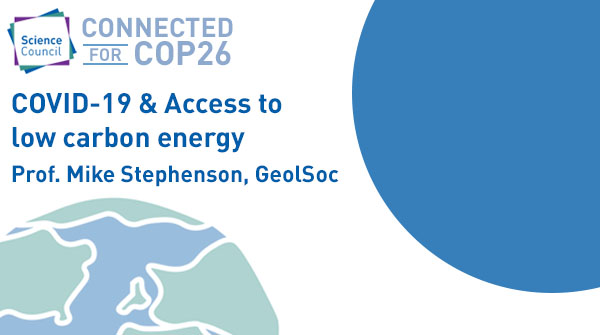
Connected for COP26: COVID-19 threatens access to low carbon energy in the developing world
This article was originally published as part of the Geological Society of London Blog.
Professor Mike Stephenson on behalf of the Geological Society.
Reaching Net Zero and decarbonisation targets will be difficult for the developing world, and new evidence suggests that COVID-19 is having a compounding effect.
In recent months the UK, China and other developed economies have set their paths to Net Zero, but different tactics will be needed in low or middle income countries across Africa, Asia, Oceania, Latin America and the Caribbean. Reduced investment in the sectors essential for low carbon energy – including geological energy storage and the mining of materials for green technology – could be critically damaging for developing economies aiming to decarbonise. On top of all this, the encouraging trend of growing access to electricity in developing countries in recent years has reversed due to the pandemic. Without access to an electrical grid, communities are being forced to revert to traditional, high carbon, solutions to heat and light their homes.
Global goals will be harder to reach
One of the 17 global goals for 2030 set by the United Nations General Assembly is for affordable, reliable, sustainable and modern energy access for all (Sustainable Development Goal 7). It is unlikely that this target will be achieved without geological solutions such as geothermal, energy storage and carbon capture and storage (CCS), and the sustainable use of fossil fuels within strict carbon budgets (Figure 2). But it’s clear now that COVID-19 will make these targets harder to reach.
The think tank Energy Transitions Commission, showed that different environments will need different solutions to decarbonise. Space-constrained territories (e.g. Hong Kong), continental climates, tropical climates and hydro-electric rich environments, have different natural advantages and challenges. Tropical climates will need more sustainable air conditioning solutions, while space-constrained territories will need to manage competing land use. Different regions will need to choose different strategies to deliver fully decarbonised energy – for example through renewable electricity, through a hydrogen economy or through controlled fossil fuel use mitigated with carbon capture and storage (CCS).
Investment challenges intensify
The greatest threat to decarbonisation in the developing world is the ongoing pandemic’s drain on investment. Quite simply, since the start of the pandemic, money has become much tighter. The International Energy Agency (IEA) has forecasted the effects of COVID-19, and this year’s World Energy Outlook (WEO) indicates that there will be significant challenges for all kinds of energy investment. Investment opportunities like electricity grid infrastructure, CCS, geothermal (Figure 3), and energy storage may be pushed out of reach for developing countries which are already financially stretched by the pandemic.
This may be most difficult for some of the more populous countries in Africa that rely on oil and gas revenues to support their economies, for example Nigeria and Angola. Reductions in their incomes due to pandemic-depressed oil and gas prices reduce the funding available for capital investment across all sectors of the economy, but especially for new energy solutions. The challenges are even more intense for state-owned enterprises, which in many developing economies are responsible for energy investment. The IEA says that financing terms are tied to the borrowing costs of their governments, and those borrowing costs are going up.
The drop in oil and gas prices could undercut clean energy options, discouraging investment, and allowing fossil fuel power stations to be kept working for longer. CCS – an important solution to the decarbonisation of both power and industry – could be even more important for developing economies like India and Indonesia where fossil fuels still have a strong role, but finance remains a challenge. Even in more developed countries, there is still no clear finance structure in place to support CCS
Large electricity grids will be vital to the energy transformation, but the financial position of many utilities companies that build and maintain the power lines, especially in lesser developed economies, has worsened as a result of the pandemic. Perhaps the most alarming problem is the decreased access to electricity. The WEO suggests that pandemic-related poverty may have made basic electricity unaffordable for more than 110 million people with established electricity connections, pushing many households back to inefficient and carbon heavy fuels for basic lighting and heating.
A worldwide challenge
This inequity is a global challenge, because the way that the rapidly developing nations access and exploit energy in the future will determine whether the world can win the climate battle. Most of the world’s growth in energy demand between now and 2050 will be in the developing world, and COVID-19 poses a real threat to our worldwide potential to thrive sustainably.
Read the rest of the blog series here.
